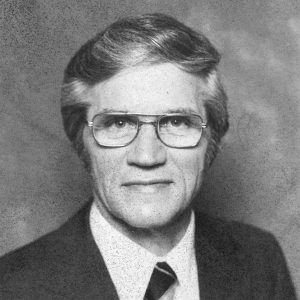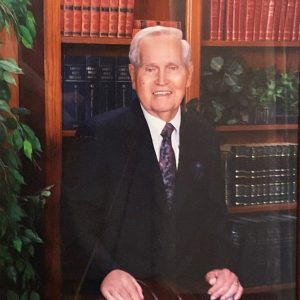calsfoundation@cals.org
John Ingram Purtle (1923–2010)
John Ingram Purtle was a populist lawyer and politician who spent eleven tempestuous years as a justice of the Arkansas Supreme Court late in the twentieth century. Purtle—who was called “the Great Dissenter” in a law review article after his death—resigned from the court in 1989 because of enduring conflicts with his fellow justices, most of whom he said had judicial philosophies that were “not in harmony” with his own. Four years before his resignation, Purtle had been charged in an arson-for-profit scheme with his legal secretary and another person, but he was acquitted in a jury trial.
John Purtle was born on September 7, 1923, the middle child of nine children of John Wesley Purtle and Edna Gertrude Ingram Purtle, who were sharecroppers in Enola (Faulkner County). The family lived in a log cabin. The upbringing made Purtle—as a lawyer, legislator, and judge—a lifelong champion of the downtrodden, including workers, minorities, the unpopular, and, in many cases, criminal defendants.
At the age of seventeen, he enlisted in the 153rd Infantry Regiment of the National Guard, which President Franklin D. Roosevelt ordered to active duty on December 23, 1940, to prepare for the approaching war. After Japanese aircraft attacked American ships at Pearl Harbor on December 7, 1941, Purtle spent the next four years in the Pacific Theater. After the end of World War II, he enrolled at Arkansas State Teachers College (now the University of Central Arkansas) in Conway (Faulkner County) and then transferred to the University of Arkansas (UA) in Fayetteville (Washington County), receiving a bachelor’s degree in law in 1950. He served in the Judge Advocate General’s Corps of the Army Reserve, retiring with the rank of lieutenant colonel.
Purtle returned to Faulkner County to practice law, and, as a disciple of President Harry S. Truman and Governor Sidney S. McMath, he immediately entered politics. He ran for the Arkansas House of Representatives from Faulkner County in 1950 and was elected, serving only one term before moving to Little Rock (Pulaski County) in 1953. He was a legislative ally of Governor McMath and sponsored a bill that would have sharply graduated the individual income tax to a marginal rate of twelve percent on the wealthiest people. He was elected to the legislature once more, in 1968, this time from Pulaski County. He sponsored one of the most controversial bills enacted during the 1969 session, Act 65, popularly called “the city killer” because it made municipal annexations impossible without the approval of voters in an area that was to be annexed. Purtle said poor people who chose to live in rural areas should not be forced to live under municipal regulations and taxes unless they chose to do so.
His law practice, as he described it when he was running for justice of the Supreme Court in 1978, consisted mainly of representing people who could not afford to pay him much, if anything. Many were indigents accused of crimes or people resisting annexation or municipal regulations.
In 1976, he ran in the Democratic primaries for a seat on the Arkansas Supreme Court and was defeated by Pulaski County Chancellor Darrell Hickman. He ran again in 1978 when Justice J. Fred Jones retired and, this time, defeated a lawyer backed by most of the bar. He said he would not accept campaign contributions from lawyers because it would present inevitable conflicts. He said his only organized support came from unions and schoolteachers.
On the court, he found himself in almost perpetual conflict with other justices, although at first it was not public. He served only eleven years, but it was believed that he wrote more dissenting opinions than any justice in the state’s history—470—many in appeals of criminal convictions. He was unusually prolific, writing 859 majority or concurring opinions, though they were often short and to the point. Purtle’s opinions were often colorful, as when he dissented in 1979 when the court upheld the perjury conviction of the embattled editor of the Sharp Citizen, Joseph Harry Weston, the famous “Editor Weston,” who had accused the grand jury that was investigating him of being a tool of corrupt politicians who were trying to shut down his newspaper. Purtle wrote: “Although appellant may have been viewed as a pusillanimous polecat by some people, he may have been nevertheless exercising his rights as guaranteed by the Constitution.” In another dissent, he wrote: “Over 125 years ago, Victor Hugo, in Les Miserables, attacked the injustice of a system that sentenced a man to imprisonment for stealing a loaf of bread. Surely we have made a little progress since that time.”
Purtle sometimes brought unwanted attention to the dignified court, as when he attended a Democratic Party campaign rally at a Little Rock hotel in 1984 at which U.S. Representative Geraldine Ferraro of New York, the Democratic candidate for vice president, spoke. A group of sign-waving abortion protesters arrived, and Justice Purtle joyfully jumped between them and television cameras, waving his own Ferraro campaign sign. His colleagues chided him in conference for the impolitic display. Another time, in 1982, he joined a candlelight vigil in front of the Supreme Court building to protest the court’s majority decision striking a utility-regulation constitutional amendment from the ballot.
Conflict between Purtle and his colleagues erupted publicly in 1985 after Purtle and Linda Nooner, his legal secretary and girlfriend, along with Luther Shamlin, were accused of arranging the arson of Nooner’s car and home to collect insurance money. The case received much attention in the Arkansas media, and the trial was moved from Pulaski County to Perry County because of the difficulty of finding jurors who had not followed the case closely. Nooner and Shamlin were convicted and sent to prison, but a jury acquitted Purtle in a separate trial.
After his indictment, his colleagues on the court urged him to stop writing opinions or deciding cases while his trial was pending in order to spare the court’s dignity and reputation for impartiality and integrity. He refused at first but finally agreed not to write opinions during the closing stages of the case. The other justices had insisted that he discharge Nooner as his legal secretary because she was publicly implicated in the crimes, but he refused until after her conviction. Relations with the court continued to worsen after his acquittal, and he resigned in 1989, saying he was tired of “butting my head against the wall.” “My basic philosophy and understanding of the law are not in harmony with those of the majority of this court,” Purtle said. “There is no likelihood that either the majority or I will change.”
In a lengthy profile in the New York Times in 1990, Purtle said he had always been an advocate of the downtrodden, even on the court, but that he had been radicalized by the experience of standing trial and facing prison for something he did not do. “I’d seen face to face what I had only seen darkly through a stained-glass mirror before,” he said. “When you hear the jail door slam behind you, it gives you a little different perspective.”
Purtle said the other justices were upset with him partly because he liked to have a good time. “I got out of the monastery sometimes,” he said. Purtle’s defense attorney in the arson case wrote after Purtle’s death that he was an unusually kind man “with two immediate passions, the law and a girlfriend with chronic financial troubles.” In addition, Purtle thought people in the Justice Building were upset that he hired an openly gay law clerk soon after he was sworn in as justice and then kept the clerk on the job even after the clerk contracted AIDS.
He returned to practicing law in Little Rock after leaving the court and then moved to Conway. Purtle was married twice, first to Marian Ruth White in 1951 and later to Phyllis Kelly. He had two children and three stepchildren.
He died on September 14, 2010, and is buried in Crestlawn Memorial Park in Conway.
For additional information:
Davis, Andy. “Ex-state Justice Purtle, 87, Dies.” Arkansas Democrat-Gazette, September 17, 2010, p. 14A.
“Judge John I. Purtle Scuffles with Abortion Group at Rally.” Arkansas Gazette, October 24, 1984, p. 1A.
Leveritt, Mara. “Judge Purtle Dissents.” Arkansas Times, August 1989, pp. 26–29, 81–84, 86.
Margolick, David. “Law: A Judicial Maverick Is Worn Down in Arkansas.” New York Times, March 16, 1990.
Perroni, Samuel A. “Setting the Record Straight on State v. John Ingram Purtle: Reflections on the Great Dissenter.” University of Arkansas Little Rock Law Review 34 (2011): 135–152. Online at http://ualr.edu/lawreview/2012/01/23/setting-the-record-straight-on-state-v-john-ingram-purtle-reflections-on-the-great-dissenter/ (accessed May 5, 2021).
Ernest Dumas
Little Rock, Arkansas










Comments
No comments on this entry yet.